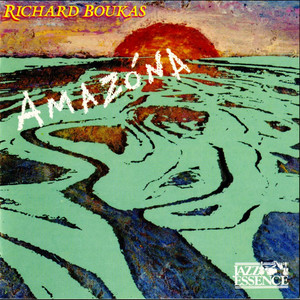
- 歌曲
- 时长
简介
Amazona is a watershed production by Richard Boukas, his first release dedicated solely to Brazilian and Latin Jazz. His varied choice of compositions, virtuoso performances as guitarist and vocalist, impeccable arranging and production show a mature artist at his peak of creative abilities achieving fresh visions and synergies of styles. Amazona was Boukas's working group from 1990-96. His tasteful use of the guitar synthesizer to play a variety of acoustic instruments (flute, muted trumpet, accordion, vibes, oboe, french horn) combined with lush textures of guitars, soaring lead vocals and complex vocal ensembles is supported by a top-shelf rhythm section: Tony Regusis, piano; John Arbo, bass and vocals; Ray Marchica, drums and percussion (Boukas also plays percussion). The concept of the project was to feature six extended compositions, four of which would be presented in both airplay (five-minute) and then Full-Play versions. In this way, the release achieved considerable airplay while opening up the longer versions to feature more solos from the other musicians. 1. Atras de Nos - is a celebratory samba sung in Portuguese. It features a full batucada (Brazilian percussion ensemble), lead and ensemble vocals, jazzy harmonies and ripping solos from Boukas and (on the full play track) Regusis. The high-pitched string instrument played by Boukas at the very opening is the cavaquinho, a steel string ukelele very common to both samba and choro. 2. Montunomorphosis - is an ambitious Latin Jazz suite featuring Boukas on lead and ensemble vocals, and a burning rhythm section. His scat solo on this track is a virtuosic tour de force, navigating complex Bebop lines over the driving Latin groove. The composition is a highly complex melding of salsa with fusion interludes and a rich harmonic vocabulary. The full play version (longer than ten minutes) also features Boukas soloing on muted trumpet (guitar synth) and Regusis on piano. 3. It Might As Well Be Fall - is a jazzy choro in AABA form which counterbalances an animated melody with stoptime accents in the rhythm section. Boukas solos on accordion (guitar synth) and Regusis (full play version) on piano. The piece finishes with a variation of the piece's introduction, giving the listener the impression that the beat has been turned around. 4. Chanson - is neither Brazilian nor Latin in character, and was the last track chosen for this session. The sailing lead vocal with English lyrics is somewhat of a throwback to Boukas's earlier years as an acoustic folksong writer– except here incorporating French Impressionist influences reminiscent of Debussy and Ravel. There are lush vocal ensemble interludes and a final coda which tap into his decades of singing a cappella polyphonic choral music. On the full play version, he solos on oboe (guitar synth). 5. Feiticeiro (The Wizard) - is a dedication to Brazilian genius composer and multi-instrumentalist Hermeto Pascoal, who has had a profound affect not only on Boukas, but musicians worldwide interested in Brazilian and other styles of music. A lively choro in AABBACCDDA form, Boukas plays the agile étude-like melody with piccolo (guitar synth). The coda trades phrases with drums, then improvisations between voice, piccolo and piano. A story worth telling: Boukas gave a score of the piece directly to Hermeto Pascoal in 1990 when the band was playing at S.O.B.'s in New York City. The person who took the piece from him while escorting Hermeto through the huge crowd was none other than pianist Jovino Santos Neto– who eight years later would begin playing with Boukas in their acclaimed duo (check out the recording BALAIO, also on CDbaby). The composition has also recently been adapted for marimba, cello and guitar (see www.boukas.com/compositions for details). 6. Amazona - is an anthem call to preserving the Brazilian rainforest. The lead vocal is divided into both English and Portuguese, and is replete with lush choral and instrumental interludes. The final verse is set in a funky groove which then opens up into extended trading between Boukas on guitar synth and Tony Regusis on piano. The production choices on this track show clear references to both Ivan Lins and Pat Metheny. 7. Atras de Nos (Full-Play) - See track 1 above. 8. It Might As Well Be Fall (Full-Play) - See track 3 above. 9. Chanson (Full-Play) - See track 4 above. 10. Montunomorphosis (Full-Play) See track 2 above.





